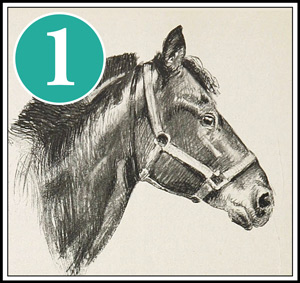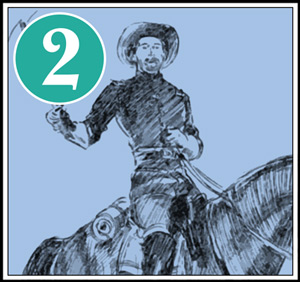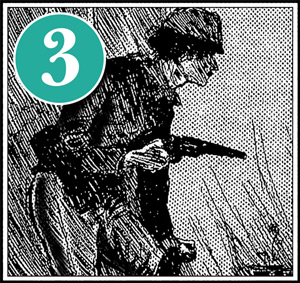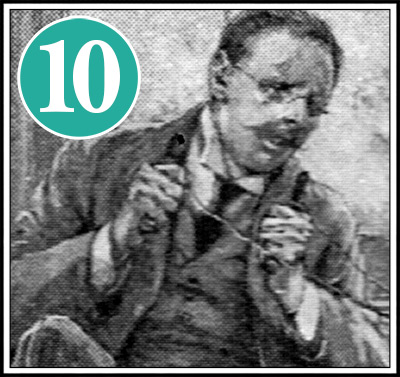
The Making of an American
Episode 10 •
The Making of an American
• We had been looking the police over by night, Roosevelt and I. We had inspected the lodging-rooms while I went over the long fight with him, and had come at last, at 2 A.M., to the Church Street Station.
Podcast: Play in new window | Download
Subscribe: Apple Podcasts | Email | TuneIn | RSS

SHOW NOTES ____________
The Making of an American (excerpt from chapter 10)
By Jacob Riis
THE lilacs blossom under my window, as I begin this chapter, and the bees are humming among them; the sweet smell of wild cherry comes up from the garden where the sunlight lies upon the young grass. Robin and oriole call to their mates in the trees. There upon the lawn is Elisabeth tending some linen laid out to dry. Her form is as lithe and her step as light as in the days I have written about, grandmother as she is. I can see, though her back is turned, the look of affectionate pride with which she surveys our home, for I know well enough what she is thinking of. And so it has been; a blessed, good home; how could it help being that with her in it?
They say it is a sign one is growing old when one’s thoughts dwell much on the past. Perhaps with me it is only a sign that the printers are on the war-path. Often when I hear her sing with the children my mind wanders back to the long winter evenings in those early years when she sat listening late for my step. She sang then to keep up her courage. My work in Mulberry Street was at night, and she was much alone, even as I was, fighting my battles there. She had it out with the homesickness then, and I think hers was a good deal the harder fight. I had the enemy all in front where I could see to whack him. But so we found ourselves and each other, and it was worth all it cost.
Except in the short winter days it was always broad daylight when I came home from work. My route from the office lay through the Fourth and the Sixth wards, the worst in the city, and for years I walked every morning between two and four o’clock the whole length of Mulberry Street, through the Bend and across the Five Points down to Fulton Ferry. There were cars on the Bowery, but I liked to walk, for so I saw the slum when off its guard. The instinct to pose is as strong there as it is on Fifth Avenue. It is a human impulse, I suppose. We all like to be thought well of by our fellows. But at 3 A.M. the veneering is off and you see the true grain of a thing.
So, also, I got a picture of the Bend upon my mind which … would help settle with that pig-sty according to its deserts. It was not fit for Christian men and women, let alone innocent children, to live in, and therefore it had to go. So with the police lodging-rooms, some of the worst of which were right there, at the Mulberry Street Station and around the corner in Elizabeth Street.
The way of it never gave me any concern that I remember. That would open as soon as the truth was told. The trouble was that people did not know and had no means of finding out for themselves. But I had. Accordingly I went poking about among the foul alleys and fouler tenements of the Bend when they slept in their filth, sometimes with the policeman on the beat, more often alone, sounding the misery and the depravity of it to their depth.
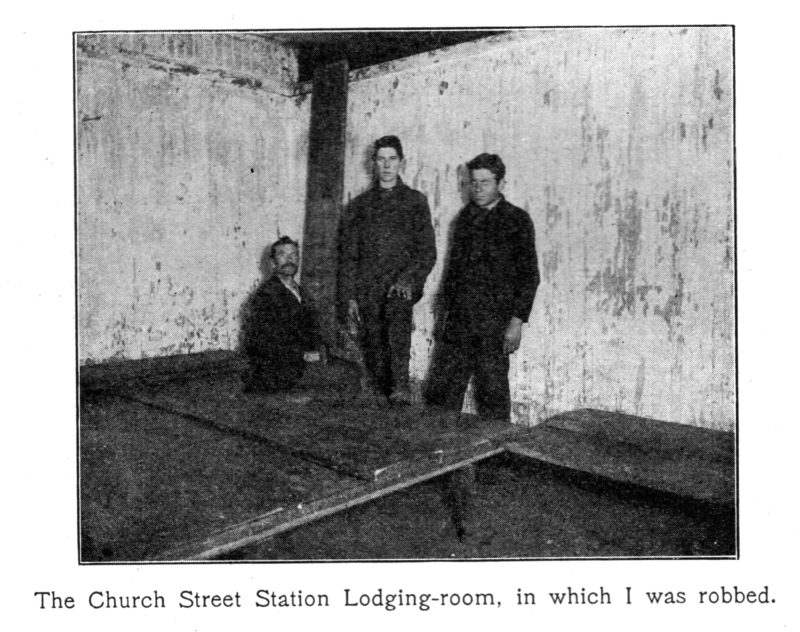 I think a notion of the purpose of it all crept into the office, even while I was only half aware of it myself, for when, after a year’s service at the police office, I was taken with a longing for the open, as it were, and went to the city editor who had succeeded Mr. Shanks with the request that I be transferred to general work, he refused flatly. I had made a good record as a police reporter, but it was not that.
I think a notion of the purpose of it all crept into the office, even while I was only half aware of it myself, for when, after a year’s service at the police office, I was taken with a longing for the open, as it were, and went to the city editor who had succeeded Mr. Shanks with the request that I be transferred to general work, he refused flatly. I had made a good record as a police reporter, but it was not that.
“Go back and stay,” he said. “Unless I am much mistaken, you are finding something up there that needs you. Wait and see.”
And so for the second time I was turned back to the task I wanted to shirk. Jonah was one of us sure enough. Those who see only the whale fail to catch the point in the most human story ever told—a point, I am afraid, that has a special application to most of us.
I have often been asked if such slumming is not full of peril. No, not if you are there on business. Mere sightseeing at such unseasonable hours might easily be. But the man who is sober and minds his own business—which presupposes that he has business to mind there—runs no risk anywhere in New York, by night or by day. Such a man will take the other side of the street when he sees a gang ahead spoiling for a fight, and where he does go he will carry the quiet assumption of authority that comes with the consciousness of a right to be where he is. That usually settles it.
There was perhaps another factor in my case that helped. Whether it was my slouch hat and my spectacles, or the fact that I had been often called into requisition to help an ambulance surgeon patch up an injured man, the nickname “Doc” had somehow stuck to me, and I was supposed by many to be a physician connected with the Health Department. Doctors are never molested in the slum. It does not know but that its turn to need them is coming next. No more was I. I can think of only two occasions in more than twenty years of police reporting when I was in actual peril, though once I was very badly frightened.
One was when a cry of murder had lured me down Crosby Street into a saloon, where the gang of the neighborhood had just stabbed the saloon-keeper in a drunken brawl. He was lying in a chair surrounded by shrieking women when I ran in.
On the instant the doors were slammed and barred behind me, and I found myself on the battlefield with the battle raging unabated. Bottles were flying thick and fast, and the bar was going to smash. As I bent over the wounded man, I saw that he was done for. The knife was even then sticking in his neck, its point driven into the backbone. The instinct of the reporter came uppermost, and as I pulled it out and held it up in a pause of the fray, I asked incautiously:— “Whose knife is this?”
A whiskey-bottle that shaved within an inch of my head, followed by an angry oath, at once recalled me to myself and showed me my role.
“You tend to your business, you infernal body-snatcher, and let us run ours,” ran the message, and I understood. I called for bandages, a sponge, and a basin, and acted the surgeon as well as I could, trying to stanch the flow of blood, while the racket rose and the women shrieked louder with each passing moment. Through the turmoil I strained every nerve to catch the sound of policemen’s tramp. It was hardly three minutes’ run to the station-house, but time never dragged as it did then. Once I thought relief had come; but as I listened and caught the wail of men being beaten in the street, I smiled wickedly in the midst of my own troubles, for the voices told me that my opponents from headquarters, following on my track, had fallen among thieves: half the gang were then outside. At last, just as an empty keg knocked my patient from his chair, the doors fell in with a crash; the reserves had come. Their clubs soon cleared the air and relieved me of my involuntary task, with my patient yet alive.
Another time, turning a corner in the small hours of the morning, I came suddenly upon a gang of drunken roughs ripe for mischief. The leader had a long dirk-knife with which he playfully jabbed me in the ribs, insolently demanding what I thought of it. I seized him by the wrist with as calm a pretence of considering the knife as I could summon up, but really to prevent his cutting me. I felt the point pricking through my clothes.
“About two inches longer than the law allows,” I said, sparring for time. “I think I will take that.”
I knew even as I said it that I had cast the die; he held my life in his hand. It was a simple question of which was the stronger, and it was already decided. Despite my utmost effort to stay it, the point of the knife was piercing my skin. The gang stood by, watching the silent struggle. I knew them—the Why-os, the worst cutthroats in the city, charged with a dozen murders, and robberies without end. A human life was to them, in the mood they were in, worth as much as the dirt under their feet, no more. At that instant, not six feet behind their backs, Captain McCullagh—the same who afterward became Chief—turned the corner with his precinct detective. I gathered all my strength and gave the ruffian’s hand a mighty twist that turned the knife aside. I held it out for inspection.
“What do you think of it, Cap?”
Four brawny fists scattered the gang to the winds for an answer.
The knife was left in my hand.
They gave me no time to get frightened. Once when I really was scared, it was entirely my own doing. And, furthermore, it served me right. It was on a very hot July morning that, coming down Mulberry Street, I saw a big gray cat sitting on a beer-keg outside a corner saloon.
It was fast asleep, and snored so loudly that it aroused my anger. It is bad enough to have a man snore, but a cat—! It was not to be borne. I hauled off with my cane and gave the beast a most cruel and undeserved blow to teach it better manners. The snoring was smothered in a yell, the cat came down from the keg, and to my horror there rose from behind the corner an angry Celt swearing a blue streak. He seemed to my anguished gaze at least nine feet tall. He had been asleep at his own door when my blow aroused him, and it was his stocking feet, propped up on the keg as he dozed in his chair around the corner, I had mistaken for a gray cat. It was not a time for explanations. I did the only thing there was to be done; I ran. Far and fast did I run. It was my good luck that his smarting feet kept him from following, or I might not have lived to tell this tale. As I said, it served me right. Perhaps it is in the way of reparation that I now support twelve cats upon my premises. Three of them are clawing at my study door this minute demanding to be let in. But I cannot even claim the poor merit of providing for them. It is my daughter who runs the cats; I merely growl at and feed them.
The mention of Bowery night cars brings to my mind an episode of that time which was thoroughly characteristic of the “highway that never sleeps.” I was on the way down town in one, with a single fellow-passenger who was asleep just inside the door, his head nodding with every jolt as though it were in danger of coming off. At Grand Street a German boarded the car and proffered a bad half-dollar in payment of his fare. The conductor bit it and gave it back with a grunt of contempt. The German fell into a state of excitement at once.
“Vat!” he shouted, “it vas pad?” and slapped the coin down on the wooden seat with all his might, that we might hear the ring. It rebounded with a long slant and fell into the lap of the sleeping passenger, who instantly woke up, grabbed the half-dollar, and vanished through the door and into the darkness, without as much as looking around, followed by the desolate howl of the despoiled German:— “Himmel! One United Shdades half-dollar clean gone!”
The time came at length when I exchanged night work for day work, and I was not sorry. A new life began for me, with greatly enlarged opportunities. I had been absorbing impressions up till then. I met men now in whose companionship they began to crystallize, to form into definite convictions; men of learning, of sympathy, and of power. My eggs hatched. From that time dates my friendship, priceless to me, with Dr. Roger S. Tracy, then a sanitary inspector in the Health Department, later its distinguished statistician, to whom I owe pretty much all the understanding I have ever had of the problems I have battled with; for he is very wise, while I am rather dull of wit. But directly I get talking things over with him, I brighten right up. I met Professor Charles F. Chandler, Major Willard Bullard, Dr. Edward H. Janes—men to whose practical wisdom and patient labors in the shaping of the Health Department’s work the metropolis owes a greater debt than it is aware of; Dr. John T. Nagle, whose friendly camera later on gave me some invaluable lessons; and General Ely Parker, Chief of the Six Nations.
I suppose it was the fact that he was an Indian that first attracted me to him. As the years passed we became great friends, and I loved nothing better in an idle hour than to smoke a pipe with the General in his poky little office at Police Headquarters. That was about all there was to it, too, for he rarely opened his mouth except to grunt approval of something I was saying. When, once in a while, it would happen that some of his people came down from the Reservation or from Canada, the powwow that ensued was my dear delight. Three pipes and about eleven grunts made up the whole of it, but it was none the less entirely friendly and satisfactory.
We all have our own ways of doing things, and that was theirs. He was a noble old fellow. His title was no trumpery show, either. It was fairly earned on more than one bloody field with Grant’s army.
Parker was Grant’s military secretary, and wrote the original draft of the surrender at Appomattox, which he kept to his death with great pride. It was not General Parker, however, but Donehogawa, Chief of the Senecas and of the remnant of the once powerful Six Nations, and guardian of the western door of the council lodge, that appealed to me, who in my boyhood had lived with Leather-stocking and with Uncas and Chingachgook. They had something to do with my coming here, and at last I had for a friend one of their kin. I think he felt the bond of sympathy between us and prized it, for he showed me in many silent ways that he was fond of me. There was about him an infinite pathos, penned up there in his old age among the tenements of Mulberry Street on the pay of a second-rate clerk, that never ceased to appeal to me. When he lay dead, stricken like the soldier he was at his post, some letters of his to Mrs. Harriet Converse, the adopted child of his tribe, went to my heart. They were addressed to her on her travels. He was of the “wolf” tribe, she a “snipe.” “From the wolf to the wandering snipe,” they ran. Even in Mulberry Street he was a true son of the forest.
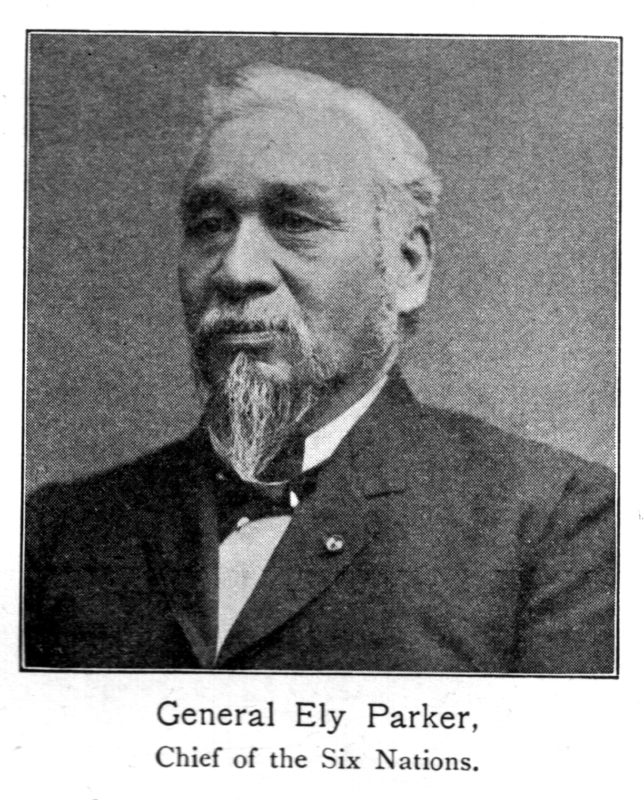 Perhaps the General’s sympathies went out to me as a fighter. The change of front from night to day brought no let-up on hostilities in our camp; rather the reverse. For this there was good cause: I had interfered with long-cherished privileges. I found the day men coming to work at all hours from ten to twelve or even one o’clock. I went on duty at eight, and the immediate result was to compel all the others to do the same. This was a sore grievance, and was held against me for a long time. The logical outcome of the war it provoked was to stretch the day farther into the small hours. Before I left Mulberry Street the circuit had been made. The watch now is kept up through the twenty-four hours without interruption. Like its neighbor the Bowery, Mulberry Street never sleeps.
Perhaps the General’s sympathies went out to me as a fighter. The change of front from night to day brought no let-up on hostilities in our camp; rather the reverse. For this there was good cause: I had interfered with long-cherished privileges. I found the day men coming to work at all hours from ten to twelve or even one o’clock. I went on duty at eight, and the immediate result was to compel all the others to do the same. This was a sore grievance, and was held against me for a long time. The logical outcome of the war it provoked was to stretch the day farther into the small hours. Before I left Mulberry Street the circuit had been made. The watch now is kept up through the twenty-four hours without interruption. Like its neighbor the Bowery, Mulberry Street never sleeps.
There had been in 1879 an awakening of the public conscience on the tenement-house question which I had followed with interest, because it had started in the churches that have always seemed to me to be the right forum for such a discussion, on every ground, and most for their own sake and the cause they stand for. But the awakening proved more of a sleepy yawn than real—like a man stretching himself in bed with half a mind to get up. Five years later, in 1884, came the Tenement-House Commission which first brought home to us the fact that the people living in the tenements were “better than the houses.”
That was a big white milestone on a dreary road. From that time on we hear of “souls” in the slum. The property end of it had held the stage up till then, and in a kind of self-defence, I suppose, we had had to forget that the people there had souls. Because you couldn’t very well count souls as chattels yielding so much income to the owner: it would not be polite toward the Lord, say. Sounds queer, but if that was not the attitude I would like to know what it was.
The Commission met at Police Headquarters, and I sat through all its sessions as a reporter, and heard every word of the testimony, which was more than some of the Commissioners did. Mr. Ottendorfer and Mr. Drexel, the banker, took many a quiet little nap when things were dull.
Four years later, toward the end of a three days’ session in Chickering Hall of ministers of every sect who were concerned about the losing fight the Church was waging among the masses, a man stood in the meeting and cried out, “How are these men and women to understand the love of God you speak of, when they see only the greed of men?”
He was a builder, Alfred T. White of Brooklyn, who had proved the faith that was in him by building real homes for the people, and had proved, too, that they were a paying investment. It was just a question whether a man would take seven per cent and save his soul, or twenty-five and lose it. And I might as well add here that it is the same story yet. All our hopes for betterment, all our battling with the tenement-house question, sum themselves up in the effort, since there are men yet who would take twenty-five per cent and run that risk, to compel them to take seven and save their souls for them.
I wanted to jump up in my seat and shout Amen! But I remembered that I was a reporter and kept still. It was that same winter, however, that I wrote the title of my book, “How the Other Half Lives.” The book itself did not come until two years after, but it was as good as written then. I had my text.
Long before that the “something that needed me” in Mulberry Street had come. I was in a death-grapple with my two enemies, the police lodging-room and the Bend. The Adler Commission had proposed to “break the back” of the latter by cutting Leonard Street through the middle of it. But no expedient would ever cover that case. The whole slum had to go. A bill was introduced to wipe it out bodily, and in 1888, after four years of pulling and hauling, we had spunked up enough to file maps for the “Mulberry Bend Park.” Blessed promise! And it was kept, if it did take a prodigious lot of effort, for right there decency had to begin, or not at all. Go and look at it to-day and see what it is like.
But that is another story. The other nuisance came first. The first guns that I have any record of were fired in my newspapers in 1883, and from that time till Theodore Roosevelt shut up the vile dens in 1895 the battle raged without intermission. The guns I speak of were not the first that were fired—they were the first I fired so far as I can find. For quite a generation before that there had been protests and complaints from the police surgeons, the policemen themselves who hated to lodge under one roof with tramps, from citizen bodies that saw in the system an outrage upon Christian charity and all decency, but all without producing any other effect than spasmodic whitewashing and the ineffectual turning on of the hose. Nothing short of boiling water would have cleansed those dens. Nothing else came of it, because stronger even than the selfish motive that exploits public office for private gain is the deadly inertia in civic life which simply means that we are all as lazy as things will let us be. The older I get, the more patience I have with the sinner, and the less with the lazy good-for-nothing who is at the bottom of more than half the share of the world’s troubles. Give me the thief if need be, but take the tramp away and lock him up at hard labor until he is willing to fall in line and take up his end. The end he lets lie some one has got to carry who already has enough.
I ran to earth at last one of the citizens’ bodies that were striving with the nuisance, and went and joined it. I will not say that I was received graciously. I was a reporter, and it was human nature to assume that I was merely after a sensation; and I did make a sensation of the campaign. That was the way to put life into it. Page after page I printed, now in this paper, now in that, and when the round was completed, went over the same road again.
They winced a bit, my associates, but bore it, egged me on even. Anything for a change. Perchance it might help. It didn’t then. But slowly something began to stir. The editors found something to be indignant about when there was nothing else. Ponderous leaders about our “duty toward the poor” appeared at intervals. The Grand Jury on its tours saw and protested. The City Hall felt the sting and squirmed.
I remember when we went to argue with the Board of Estimate and Apportionment under Mayor Grant. I had gone to Boston to see the humane way in which they were dealing with their homeless there. They gave them a clean shirt and a decent bed and a bath—good way, that, to limit the supply of tramps—and something to eat in the morning, so they did not have to go out and beg the first thing. It seemed good to me, and it was good. But the Mayor did not think so.
“Boston! Boston!” he cried, impatiently, and waved us and the subject aside. “I am tired of hearing always how they do in Boston, and of the whole matter.”
So were we, tired enough to keep it up. We came back next time, though it didn’t do any good, and meanwhile the newspaper broadsides continued. No chance was allowed to pass of telling the people of New York what they were harboring. They simply needed to know, I felt sure of that. And I know now that I was right. But it takes a lot of telling to make a city know when it is doing wrong. However, that was what I was there for. When it didn’t seem to help, I would go and look at a stone-cutter hammering away at his rock perhaps a hundred times without as much as a crack showing in it. Yet at the hundred and first blow it would split in two, and I knew it was not that blow that did it, but all that had gone before together. When my fellow-workers smiled, I used to remind them of the Israelites that marched seven times around Jericho and blew their horns before the walls fell.
“Well, you go ahead and blow yours,” they said; “you have the faith.”
And I did, and the walls did fall, though it took nearly twice seven years. But they came down, as the walls of ignorance and indifference must every time, if you blow hard enough and long enough, with faith in your cause and in your fellow-man. It is just a question of endurance. If you keep it up, they can’t.
They began to give, those grim walls, when typhus fever broke out in the city in the winter of 1891-92. The wonder was that it did not immediately centre in the police lodging-rooms. There they lay, young and old, hardened tramps and young castaways with minds and souls soft as wax for their foulness to be stamped upon. As a footnote: The old cry of sensation mongering was raised more than once when I was making my charges. People do not like to have their rest disturbed. Particularly did the critics object to the statement that there were young people in the dens; they were all old tramps, they said. For an answer I went in and photographed the boys and girls one night, and held their pictures up before the community. In the Oak Street Station alone, one of the vilest, there were six as likely young fellows as I ever saw, herded with forty tramps and thieves. Not one of them would come out unscathed.
Dirty as they came in from every vile contact, they went out in the morning to scatter from door to door, where they begged their breakfast, the seeds of festering disease. Turning the plank was “making the bed.” Typhus is a filth-disease, of all the most dreaded. If ever it got a foothold in those dens, there was good cause for fear. I drew up at once a paper, had it signed by representatives of the united charitable societies—some of them shrugged their shoulders, but they signed—and took it to the Health Board. They knew the danger better than I. But the time had not yet come. Perhaps they thought, with the reporters, that I was just “making copy.” For I made a “beat” of the story. Of course I did. We were fighting; and if I could brace the boys up to the point of running their own campaigns for making things better, so much was gained. But they did not take the hint. They just denounced my “treachery.”
I warned them that there would be trouble with the lodging-rooms, and within eleven months the prophecy came true. The typhus broke out there.
The night after the news had come I took my camera and flashlight and made the round of the dens, photographing them all with their crowds. Of the negatives I had lantern-slides made, and with these under my arm knocked at the doors of the Academy of Medicine, demanding to be let in. That was the place for that discussion, it seemed to me, for the doctors knew the real extent of the peril we were then facing. Typhus is no respecter of persons, and it is impossible to guard against it as against the smallpox. They let me in, and that night’s doings gave the cause of decency a big push. I think that was the first time I told the real story of my dog. I had always got around it somehow; it choked me even then, twenty years after and more, anger boiled up in me so at the recollection.
We pleaded merely for the execution of a law that had been on the statute-books six years and over, permitting the city authorities to establish a decent lodging-house; but though the police, the health officials, the grand jury, the charitable societies, and about everybody of any influence in the community fell in behind the medical profession in denouncing the evils that were, we pleaded in vain. The Tammany officials at the City Hall told us insolently to go ahead and build lodging-houses ourselves; they had other things to use the city’s money for than to care for the homeless poor; which, indeed, was true. The Charity Organization Society that stood for all the rest gave up in discouragement and announced its intention to start a Wayfarer’s Lodge itself, on the Boston plan, and did so. “You see,” was the good-by with which my co-laborers left me, “we will never succeed.” My campaign had collapsed.
But even then we were winning. Never was defeat in all that time that did not in the end turn out a step toward victory. This much the unceasing agitation had effected, though its humane purpose made no impression on the officials, that the accommodation for lodgers in the station-houses was sensibly shrunk. Where there had been forty that took them in, there were barely two dozen left. The demand for separate women’s prisons with police matrons in charge, which was one of the phases the new demand for decency was assuming, bred a scarcity of house-room, and one by one the foul old dens were closed and not reopened. The nuisance was perishing of itself. Each time a piece of it sloughed off, I told the story again in print, “lest we forget.” In another year reform came, and with it came Roosevelt.
We had been looking the police over by night, Roosevelt and I. We had inspected the lodging-rooms while I went over the long fight with him, and had come at last, at 2 A.M., to the Church Street Station. It was raining outside. The light flickered, cold and cheerless, in the green lamps as we went up the stone steps. Involuntarily I looked in the corner for my little dog; but it was not there, or any one who remembered it. The sergeant glanced over his blotter grimly, I had almost to pinch myself to make sure I was not shivering in a linen duster, wet to the skin. Down the cellar steps to the men’s lodging-room I led the President of the Police Board. It was unchanged—just as it was the day I slept there. Three men lay stretched at full length on the dirty planks, two of them young lads from the country. Standing there, I told Mr. Roosevelt my own story. He turned alternately red and white with anger as he heard it.
“Did they do that to you?” he asked when I had ended.
For an answer, I pointed to the young lads then asleep before him. “I was like this one,” I said.
He struck his clenched fists together. “I will smash them to-morrow.”
He was as good as his word. The very next day the Police Board took the matter up.
Provision was made for the homeless on a barge in the East River until plans could be perfected for sifting the tramps from the unfortunate; and within a week, on recommendation of the Chief of Police, orders were issued to close the doors of the police lodging-rooms on February 15, 1896, never again to be unbarred.
The battle was won. The murder of my dog was avenged, and forgiven, after twenty-five years. The yellow newspapers, with the true instinct that made them ever recognize in Roosevelt the implacable enemy of all they stood for, printed cartoons of homeless men shivering at a barred door “closed by order of T. Roosevelt”; but they did not, after all, understand the man they were attacking. That the thing was right was enough for him. Their shafts went wide of the mark, or fell harmless. The tramps for whom New York had been a paradise betook themselves to other towns not so discerning—went to Chicago, where the same wicked system was in operation until last spring, is yet for all I know—and the honestly homeless got a chance.
 A few tender-hearted and soft-headed citizens, of the kind who ever obstruct progress by getting some very excellent but vagrant impulses mixed up with a lack of common sense, wasted their sympathy upon the departing hobo, but soon tired of it. I remember the case of one tramp whose beat was in the block in Thirty-fifth Street. He was arrested for insolence to a housekeeper who refused him food. The magistrate discharged him, with some tearful remarks about the world’s cruelty and the right of a man to be poor without being accounted a criminal. Thus encouraged, the tramp went right back and broke the windows of the house that had repelled him. I presume he is now in the city by the lake holding up people who offend him by being more industrious and consequently more prosperous than he.
A few tender-hearted and soft-headed citizens, of the kind who ever obstruct progress by getting some very excellent but vagrant impulses mixed up with a lack of common sense, wasted their sympathy upon the departing hobo, but soon tired of it. I remember the case of one tramp whose beat was in the block in Thirty-fifth Street. He was arrested for insolence to a housekeeper who refused him food. The magistrate discharged him, with some tearful remarks about the world’s cruelty and the right of a man to be poor without being accounted a criminal. Thus encouraged, the tramp went right back and broke the windows of the house that had repelled him. I presume he is now in the city by the lake holding up people who offend him by being more industrious and consequently more prosperous than he.
I have not set out here to discuss reform and its merits, but merely to point out that the way of it, the best way of bringing it on—indeed, the only way that is always open—is to make the facts of the wrong plain. And, having said that, I have put the reporter where he belongs and answered the question why I have never wanted executive office and never will.
And now, in taking leave of this subject, of which I hope I may never hear again, for it has plagued me enough and had its full share of my life, is there not one ray of brightness that falls athwart its gloom? Were they all bad, those dens I hated, yes, hated, with the shame and the sorrow and hopeless surrender they stood for? Was there not one glimpse of mercy that dwells in the memory with redeeming touch?
Yes, one. Let it stand as testimony that on the brink of hell itself human nature is not wholly lost. There is still the spark of His image, however overlaid by the slum. And let it forever wipe out the score of my dog, and mine. It was in one of the worst that I came upon a young girl, pretty, innocent—Heaven knows how she had landed there. She hid her head in her apron and wept bitterly with the shame of the thing. Around her half a dozen old hags, rum-sodden and foul, camped on the stone floor. As in passing I stooped over the weeping girl, one of them, thinking I was one of the men about the place, and misunderstanding my purpose, sprang between us like a tigress and pushed me back.
“Not her!” she cried, and shook her fist at me; “not her! It is all right with us. We are old and tough. But she is young, and don’t you dare!”
I went out and stood under the stars, and thanked God that I was born. Only tramps! It had been dinned into my ears until I said it myself, God forgive me! Aye, that was what we had made of them with our infernal machinery of rum-shop, tenement, dive, and—this place. With Christian charity instead, what might they not have been?
• • • • • • • • • • • • • • • • • • • • • • • • • • • • • •
By subscribing, you will automatically receive the latest episodes downloaded to your computer or portable device. Select your preferred subscription method above.
To subscribe via a different application: Go to your favorite podcast application or news reader and enter this URL: https://clearwaterpress.com/byline/feed/podcast/

